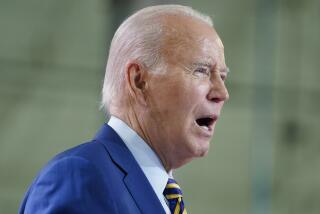White House Can’t Prove Health Plan Saves Money
- Share via
WASHINGTON — The White House, bowing to the conclusions of government number-crunchers, will not formally claim any short-term budget savings from the health care reform package President Clinton plans to present to Congress next month, officials said Wednesday.
Throughout his campaign and into the early weeks of his Administration, Clinton repeatedly insisted that the “managed competition” system he hopes to put into place would save billions of dollars now spent on health care. But budget experts working on the health package have refused to sign off on any cost-saving projections, saying they cannot prove health care reform will actually save money because it has never been tried before.
Although Administration policy experts insist the actuaries are wrong and that the new system will save money, they agree they cannot argue the point without risking the credibility of the entire package.
“We’re going to put forward the most conservative projections,” one senior White House aide said. “That means we’ll overstate the costs and understate revenues.”
The result almost certainly will be to push Clinton toward a larger tax package to pay for health care reform because he will not be able to use projected savings to cover the cost of the plan. In addition, the decision may increase pressure on the Administration to put into place some form of short-term price controls to restrain health care spending while a new health system is phased in.
Clinton is expected to make a series of important decisions on the shape of the new health care plan next week, after reviewing a thick notebook full of options at Camp David, Md., this weekend. He had planned to conduct a series of meetings on the health care plan this week but put them off to lobby Congress for his budget.
Administration aides hope to have Clinton present the health care plan to Congress in late June, once the budget and tax bill clear initial hurdles in the Senate. But if the Senate stalls on the budget bill, they say, the health care plan will have to be put off until mid-July, after Clinton returns from the economic summit in Tokyo.
Even so, top Administration officials already have begun an aggressive attempt to sell the basic principles of the health plan. First Lady Hillary Rodham Clinton, for example, delivered a populist, campaign-style speech before a sympathetic audience of union activists Wednesday, urging them to join her crusade for health care reform and saying the changes will bring peace of mind and a sense of security to every American.
Mrs. Clinton said that the threat of losing coverage is widespread, arguing that 2 million Americans now lose their medical insurance for part of each year.
“We can no longer take for granted, if we are employed and our employer provides insurance, that it will always be there for us when we need it,” she told about 500 members of the Service Employees International Union.
With 1 million members in the union, 40% of whom work in the health care field, many in the audience had expected the First Lady to address their concern about possible job loss as a result of efforts to restructure the health care system.
Instead, Mrs. Clinton repeatedly sounded a theme likely to dominate the Administration’s public campaign for grass-roots support for its plan.
“Security is what this health care debate is all about,” said Mrs. Clinton, who chairs the President’s health care reform task force. “Can your family find peace of mind? Can you or your child get the quality of care when you need it most? That’s what we have to be focusing on every single day.
“Talk to your friends and neighbors about what you see every day in terms of price gouging, cost shifting, unconscionable profiteering,” she said. “Explain how you see the system that is being gamed and ripped-off because it has no real discipline, no budget, no controls.
“Part of the reason we are in this spiraling cost explosion . . . is because too many people have made too much money off of eliminating opportunities for caring for people instead of expanding those,” she said.
More to Read
Get the L.A. Times Politics newsletter
Deeply reported insights into legislation, politics and policy from Sacramento, Washington and beyond. In your inbox twice per week.
You may occasionally receive promotional content from the Los Angeles Times.











